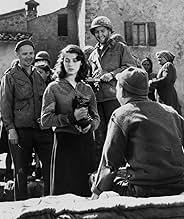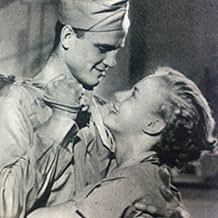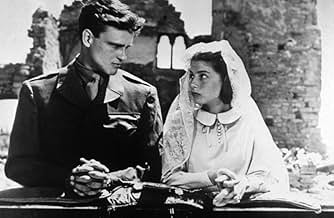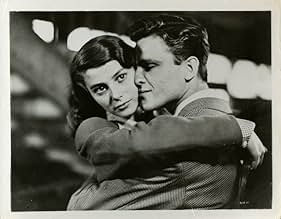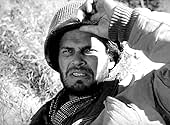Agrega una trama en tu idiomaA reluctant soldier, Peter, serves in Italy during WWII. He marries a local girl named Teresa and brings her to the US.A reluctant soldier, Peter, serves in Italy during WWII. He marries a local girl named Teresa and brings her to the US.A reluctant soldier, Peter, serves in Italy during WWII. He marries a local girl named Teresa and brings her to the US.
- Dirección
- Guionistas
- Elenco
- Nominado a 1 premio Óscar
- 1 premio ganado y 2 nominaciones en total
Lewis E. Ciannelli
- Cheyenne
- (as Lewis Cianelli)
Guido Martufi
- Sergio Russo
- (sin créditos)
Opiniones destacadas
This movie launched the feature film debut of four actors that would later go on to reach some success: Pier Angeli, John Ericson, Ralph Meeker, and Rod Steiger. It was also the first of three films for Bill Mauldin, a famous illustrator for "The Stars & Strips" (the military's newspaper during World War II). The only known actors in the movie were Patricia Collinge (The Little Foxes) and Peggy Ann Garner (A Tree Grows in Brooklyn).
The movie begins with Philip Cass (John Ericson) in a session with his VA psychologist, Frank (Rod Steiger), after returning from the war in Italy. He is having trouble fitting in with civilian life.
His story is related to us in flashback— While serving in Italy, Philip is clearly scared and unable to fight the German enemy until Sgt Dobbs (Ralph Meeker) steps in to guide him to fight. During a battle with the Germans, Philip's assignment is to hide in the bushes and let the Germans pass him by and then shoot up a flare for US soldiers to be ready to fight them down steam Unable to do even this, he is sent to a local hospital with battle fatigue. There he learns that Dobbs had been killed in the fight. Filled with guilt and shame, he hides his head in the pillow and cries.
While in Italy, he and a group of US soldiers are assigned to bivouac in an Italian home. There, he meets, dates, and falls in love with a young Italian girl, Teresa (Pier Angeli). They get married and have a honeymoon in Rome. When he ships out for the US, he must leave his war bride behind until she is authorized to join him.
This brings us back to his private battle in the US: He must find a job and make his own home. But, to do this, he must face his possessive mother, Patricia Collinge, and spineless father, Richard Bishop. There are some fine scenes in this movie, especially between, John Ericson and Pier Angeli. However, there is nothing subtle about the story, which "hits us over the head" rather than simply indicating its meaning.
The movie begins with Philip Cass (John Ericson) in a session with his VA psychologist, Frank (Rod Steiger), after returning from the war in Italy. He is having trouble fitting in with civilian life.
His story is related to us in flashback— While serving in Italy, Philip is clearly scared and unable to fight the German enemy until Sgt Dobbs (Ralph Meeker) steps in to guide him to fight. During a battle with the Germans, Philip's assignment is to hide in the bushes and let the Germans pass him by and then shoot up a flare for US soldiers to be ready to fight them down steam Unable to do even this, he is sent to a local hospital with battle fatigue. There he learns that Dobbs had been killed in the fight. Filled with guilt and shame, he hides his head in the pillow and cries.
While in Italy, he and a group of US soldiers are assigned to bivouac in an Italian home. There, he meets, dates, and falls in love with a young Italian girl, Teresa (Pier Angeli). They get married and have a honeymoon in Rome. When he ships out for the US, he must leave his war bride behind until she is authorized to join him.
This brings us back to his private battle in the US: He must find a job and make his own home. But, to do this, he must face his possessive mother, Patricia Collinge, and spineless father, Richard Bishop. There are some fine scenes in this movie, especially between, John Ericson and Pier Angeli. However, there is nothing subtle about the story, which "hits us over the head" rather than simply indicating its meaning.
A movie of note only because it stars a 19 year old Pier Angeli, who plays an Italian girl who meets an American solider (John Ericson) during the war, and marries him shortly thereafter. Angeli is bright-eyed and radiant, and I loved her conversations with her family in Italian, even if they weren't subtitled (maybe even more so because they weren't). Briefly seeing some of the sites in Rome was also nice. Unfortunately, Ericson is not nearly as good as Angeli. His character is admittedly difficult to play and not all that likeable, suffering from panic attacks, lack of confidence, and overall wishy-washiness. I loved how the film is honest in its depiction of war, showing us fear and cowardice, but unfortunately there are no real consequences to it. There are hints at the generation gap of the 1950's, but Ericson is no James Dean. The story telling from director Fred Zinnemann is too segmented and scattered, shifting from war film, to war bride film, to domineering mother film. Patricia Collinge is brilliant as the mom, particularly as we come to understand just how controlling she is, but it's at a point in the film where we just don't see the focus. The ending is also abrupt and unbelievable, as if the filmmakers didn't where to go with it either.
Fred Zinnemann's attempt at Neo-Realism is a drab story about a soldier who brings his war bride back to America to live with his disappointment of a father and his overbearing mother. Pier Angeli, as the bride, is lovely, but John Ericson, as the soldier, isn't up to the acting challenge asked of him. Patricia Collinge is decent as his mom, but everyone is done a disservice by Zinnemann's detached direction. I think he was going for understated realism but everything is so understated as to be lacking in any kind of emotional impact whatsoever.
"Teresa" received a 1951 Oscar nomination for Best Motion Picture Story, a category that later was absorbed into the Original Screenplay Oscar.
Grade: C
"Teresa" received a 1951 Oscar nomination for Best Motion Picture Story, a category that later was absorbed into the Original Screenplay Oscar.
Grade: C
"Teresa", is a movie that is time well spent for several reasons. Patricia Collinge delivers a performance atypical of the most memorable characters she had played to that point in her career. When I think of Collinge, I think of her as the quintessential, albeit clueless mother in Hitchcock's, "Shadow Of A Doubt". The other character was the sympathetic, "Aunt Birdie", from the director, William Wyler's classic film, "The Little Foxes". Collinge, in "Teresa", is spine chilling as a domineering mother / mother-in-law from Hell. She is a great performer. The next reason to recommend spending time viewing this film is for the fine effort by the brilliant director, Fred Zinneman. His talents lend a positive element which makes the film artistically better than good. He was truly a great director. Finally, there is the powerful, yet poignant performance by Pier Angeli. She was perfectly cast as the young girl from post war Italy, who falls in love with an American soldier. Angeli was young, pretty and believable in her role. Zinneman really squeezed a gem of an acting performance from Pier Angeli that left me most moved. The story itself is good, with some predictability, but not to a degree that would make one roll their eyes. I saw this movie just once, several years ago. I am more critical than most when I watch a film. I have been hoping TCM would run it again, as this movie, "Teresa", left a very favorable impression on me. I wholeheartedly recommend this film to lovers of classic films, and to those who like stories from the post WWII era. The other elements are that, "Teresa", offers a good viewing for fans of love stories and stories involving strong, heroic female characters.
My main reasons for seeing 'Teresa' were for Fred Zinnemann and the subject. Zinnemann made a number of great films, 'High Noon', 'The Day of the Jackal', 'A Man for All Seasons' and 'From Here to Eternity' and was a fine director. The subject was a bold one at the time and the studio could never be commended enough for tackling difficult contemporary issues for the time (some still relevant now) and mostly handling them uncompromisingly. The mixed reviews weren't enough to deter me.
On the most part, to me 'Teresa' was a very sincere and brave effort. A well done film with a lot of merits, the best of them quite brilliantly executed. It is not great and has a few big drawbacks, and as far as Zinnemann's films go it towards the lesser end. That 'Teresa' did so courageously in tackling a subject as tough as this and generally not doing too bad a job with it is to be applauded in my view, even if it doesn't completely succeed (which was a bit of a shame).
'Teresa's' biggest issue is John Ericson, who did not have an easy role admittedly but was clearly over-parted by it. He didn't have the charisma, intensity or pathos for the role and often seemed unsure of how to play the character or what to do with him. The whole character came over as muddled, with such all over the place motivations and such it was very difficult to feel anything for him.
Do agree too with those that have said that the ending was very abrupt and too mawkish, which did feel at odds with the tone of the rest of the film. The script is not always very focused and could have gone into more depth in places.
Generally though, that it pulled no punches, was intelligently written and was written with honesty and respect was much appreciated. The story, regardless of any slightness, mostly does very well executing such a bold subject, and does so so sincerely and so movingly. It had hard-hitting tension and also poignant pathos, nothing is sugar-coated here. Zinnemann's direction is understated which did suit the film and to me it didn't go overboard on that and he didn't seem disinterested or uncomfortable with the material.
Visually, 'Teresa' is very well made with an effective documentary-like approach to the filming. The locations are nice too. The score is moody without being intrusive. The supporting cast are very good, with two of the most interesting characters being those for Ralph Meeker and Patricia Collinge. Rod Steiger is also very good in a very early role and one of his more subdued ones. Best of all is a truly touching Pier Angeli, whose performance and presence is always genuine with nothing ringing false.
All in all, a lot to recommend but with a better male lead and ending 'Teresa' could have been a winner. 7/10
On the most part, to me 'Teresa' was a very sincere and brave effort. A well done film with a lot of merits, the best of them quite brilliantly executed. It is not great and has a few big drawbacks, and as far as Zinnemann's films go it towards the lesser end. That 'Teresa' did so courageously in tackling a subject as tough as this and generally not doing too bad a job with it is to be applauded in my view, even if it doesn't completely succeed (which was a bit of a shame).
'Teresa's' biggest issue is John Ericson, who did not have an easy role admittedly but was clearly over-parted by it. He didn't have the charisma, intensity or pathos for the role and often seemed unsure of how to play the character or what to do with him. The whole character came over as muddled, with such all over the place motivations and such it was very difficult to feel anything for him.
Do agree too with those that have said that the ending was very abrupt and too mawkish, which did feel at odds with the tone of the rest of the film. The script is not always very focused and could have gone into more depth in places.
Generally though, that it pulled no punches, was intelligently written and was written with honesty and respect was much appreciated. The story, regardless of any slightness, mostly does very well executing such a bold subject, and does so so sincerely and so movingly. It had hard-hitting tension and also poignant pathos, nothing is sugar-coated here. Zinnemann's direction is understated which did suit the film and to me it didn't go overboard on that and he didn't seem disinterested or uncomfortable with the material.
Visually, 'Teresa' is very well made with an effective documentary-like approach to the filming. The locations are nice too. The score is moody without being intrusive. The supporting cast are very good, with two of the most interesting characters being those for Ralph Meeker and Patricia Collinge. Rod Steiger is also very good in a very early role and one of his more subdued ones. Best of all is a truly touching Pier Angeli, whose performance and presence is always genuine with nothing ringing false.
All in all, a lot to recommend but with a better male lead and ending 'Teresa' could have been a winner. 7/10
¿Sabías que…?
- TriviaFilm debut of Rod Steiger.
- ErroresWhen the ambulance backs up to the hospital in front of the church, a set of four studio lights is reflected in its rear windows.
- Citas
Mrs. Clara Cass, Philip's Mother: [to Philip] You'll never be a salesman, sonny.
- ConexionesFeatured in The Metro-Goldwyn-Mayer Story (1951)
Selecciones populares
Inicia sesión para calificar y agrega a la lista de videos para obtener recomendaciones personalizadas
- How long is Teresa?Con tecnología de Alexa
Detalles
- Fecha de lanzamiento
- País de origen
- Idiomas
- También se conoce como
- Die Geschichte einer Braut
- Locaciones de filmación
- Scascoli, Loiano, Bolonia, Emilia-Romaña, Italia(Italian village scenes)
- Productora
- Ver más créditos de la compañía en IMDbPro
- Tiempo de ejecución
- 1h 42min(102 min)
- Color
- Relación de aspecto
- 1.37 : 1
Contribuir a esta página
Sugiere una edición o agrega el contenido que falta

